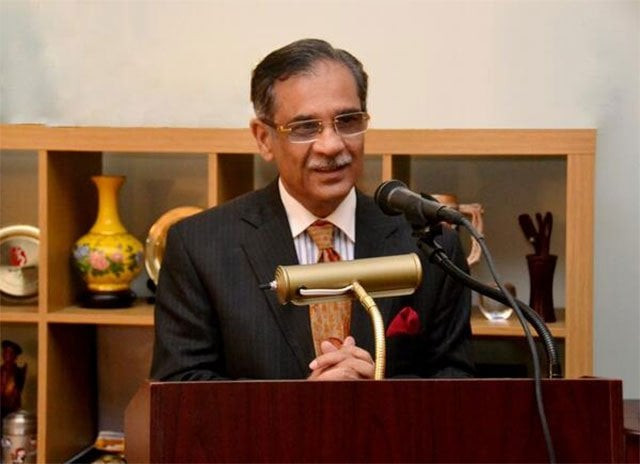Sessions judge defends complaint against CJP
Tareen was suspended for forgoing proper channel in recording complaint against top judge

Chief Justice of Pakistan Mian Saqib Nisar. PHOTO: EXPRESS
The Kohat district judge had filed a complaint against the CJP in the Supreme Judicial Council (SJC) over alleged misconduct last month. Subsequently, he was suspended and issued a show-cause notice by the PHC for misconduct by forgoing proper channel and directly filing a complaint.
Citing that the “complaint contains derogatory remarks and scandalous narration against the chief justice which is tantamount to ridiculing the judiciary as a whole”, the PHC ruled out an inquiry over his complaint and sought a written defence. The copy of reply is available with The Express Tribune.
In his defence, Tareen stated that the SJC is a constitutionally mandated quasi-judicial forum for the accountability of judges that extended every member of the public a right to seek inquiry. “Neither there is any restrictive clause in Article 209 of the Constitution nor is there any provision under the Supreme Judicial Council Procedure of Enquiry, 2005 that a government servant or a judicial officer is precluded from sending out the information and seeking inquiry about conduct of a Judge within meaning of Clause (5) of Article 209 ibid.”
The reply stressed that the judge had lodged complaint to uphold thoughts regarding existence of a prescribed code of conduct to be observed by the judges of higher court was “purely” private act “having no nexus with his job as district and sessions judge”.
“There is no barring provision either in Khyber-Pakhtunkhwa Government Servants (Conduct) Rules 1987 or in special instructions on Judicial Officers’ Conduct and Discipline encoded in Section-2 of Chapter IV of the Judicial Estacode 20111 that a judicial official is stopped from freedom of thought and expression in his personal character.”
It is further stated that submitting of complaint directly to SJC did not violate any norm of the service discipline hence the charge of misconduct against the complainant suffered “from illegality, inequity, impropriety, recklessness, and with motivation to bring the answering accused under undue pressure with advantage of his subordination.”
Citing the definition of competent authority from Rule 2(f) of the KPK Government Servants (Efficiency & Discipline) Rules 2011, the reply claims that the chief justice of PHC is not appointing authority of the District & Sessions Judge under KPK Judicial Service Rules 2001 and as such he in his discretion is not competent to initiate disciplinary proceedings against the answering accused under the said law. So, the impugned show cause notice has not been properly issued.
"The answering accused fortified by the foregoing submissions reasonably expects that wisdom and not the emotions will prevail and he will not be hindered in the way in his pursuit of the complaint before the SJC, where penal action is in waiting if his complaint is found false"
Stating that the allegation of not adopting a proper channel to file the complaint itself was ‘self-speaking’ since the complaint did not pass through channel of the high court yet it mysteriously was able to go through the contents of complaint.
Asserting that the answering accused “strongly believed” to emerge successful as and when the complaint in question is taken up by the SJC, the reply that if the information was found as false material, malignant, scandalous or contemptuous, the complainant will be liable to penal action prescribed in the Paragraph-14 of the Supreme Judicial Council Procedure of Enquiry 2005.
The written defense stated that the move against Tareen through disciplinary proceedings “cannot be given any other meaning than one that it is meant to suppress his voice coercively using sword of service laws in utter disregard to his constitutional rights as a common man.”


1724319076-0/Untitled-design-(5)1724319076-0-208x130.webp)
















COMMENTS
Comments are moderated and generally will be posted if they are on-topic and not abusive.
For more information, please see our Comments FAQ